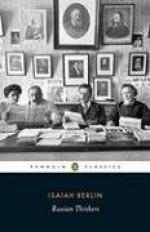
|
| Name: _________________________ | Period: ___________________ |
This test consists of 5 multiple choice questions, 5 short answer questions, and 10 short essay questions.
Multiple Choice Questions
1. When did the Decembrist rebellion take place?
(a) 1848.
(b) 1817
(c) 1825.
(d) 1809.
2. How does Berlin describe conservative Romantics?
(a) Conservative Romantics believed that the best progress was a return to traditional Russian values.
(b) Conservative Romantics believed that intellectuals could thrive without changing the aristocratic government.
(c) Conservative Romantics believed that mechanical reforms would not work without a deep understanding of the Russian soul
(d) Conservative Romantics believed that progress was a trap, and that the only way out would be to develop Russian nationalism.
3. Where did the term "intelligentsia" come from?
(a) It was coined by the press during the Dreyfus Affair.
(b) It had always been a role in Russian society.
(c) The Tsar had used it to demean effete thinkers.
(d) It was invented in the mid-1800s.
4. According to Berlin, what did Tolstoy have the greatest faith in?
(a) Divine causes.
(b) Individual experience.
(c) Nations.
(d) History.
5. What did Herzen see as the individual's role in history?
(a) Herzen saw as the individual's role in history as an obligation to manifest the universe's latent desires.
(b) Herzen saw as the individual's role in history as an obligation to heal society from the damages done by progress.
(c) Herzen saw as the individual's role in history as an obligation to understand and cooperate with historical forces.
(d) Herzen saw as the individual's role in history as an obligation to fulfill his own nature.
Short Answer Questions
1. What dictum of Schelling's represented the Russian literary scene in the nineteenth century?
2. How did the Intelligentsia see their role in society?
3. How does Berlin describe Bakunin?
4. Whose writing was Russia "intellectually dependent" upon?
5. What was Pavel Annekov's role in Russian culture?
Short Essay Questions
1. What did Russian students learn in German universities?
2. How did Bakunin react to Hegel's philosophy?
3. What was Herzen's reaction to Hegelian ideology?
4. What did Nicholas Stankevich find attractive in Hegel's theories?
5. What saying of Schelling's represents the relationship of artists to their times in Russian ideology of the mid-nineteenth century?
6. What example does Tolstoy use to explain why human beings cannot know all the actions and causes that affect their experiences?
7. Name some of the thinkers who influenced Herzen's thinking.
8. Whose writings had Russian intellectuals and writers primarily been influenced by?
9. Describe the difference between progressive and reactionary Romanticism.
10. How did the revolutions of 1848 affect western European intellectuals and Russians differently?
|
This section contains 810 words (approx. 3 pages at 300 words per page) |

|




